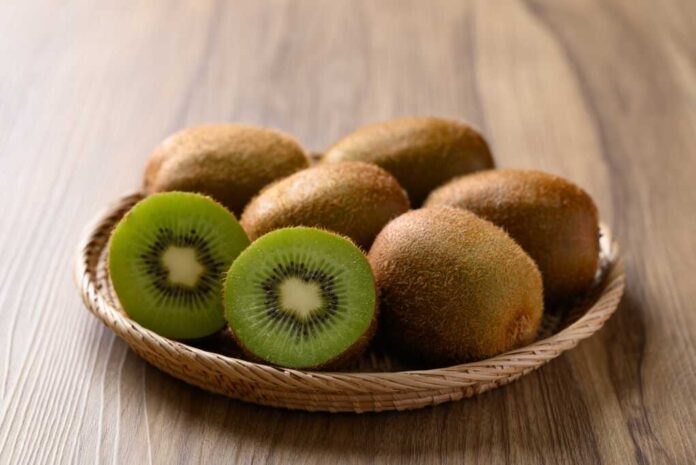
Eating two kiwifruits daily could be the natural solution for ending digestive discomfort and constipation, according to new research that has both doctors and patients rethinking gut health approaches.
At a Glance
- Clinical studies show that consuming two green kiwifruits daily significantly improves bowel movement frequency and reduces gastrointestinal pain in people with constipation or IBS-C
- Kiwifruits contain a unique combination of dietary fiber and the actinidin enzyme, which aids protein digestion and promotes gut motility
- One kiwi provides more vitamin C than two oranges, supporting gut lining health and offering immune system benefits
- Kiwi consumption increases blood flow and improves overall digestive comfort with effects superior to some traditional fiber supplements
The Science Behind Kiwi’s Digestive Powers
The humble kiwifruit, originally from China and sometimes called Chinese gooseberry, has emerged as a digestive health powerhouse according to multiple clinical studies. A significant international multicenter randomized controlled trial published in the American Journal of Gastroenterology found that eating just two kiwifruits daily substantially increases bowel movement frequency while decreasing gastrointestinal pain for those suffering from functional constipation or irritable bowel syndrome with constipation (IBS-C).
Remarkably, in comparative studies, kiwifruits demonstrated more consistent benefits than psyllium, a commonly recommended fiber supplement. Researchers noted that while psyllium showed significant improvements only for IBS-C participants, kiwifruits provided digestive relief across broader constipation conditions. The fruit’s effectiveness stems from its unique combination of soluble and insoluble dietary fibers that work through mechanisms including “water retention, capacity and swelling, and viscosity.”
How Kiwi Works in Your Digestive System
Kiwifruit’s digestive benefits extend beyond its fiber content. The fruit contains a special enzyme called actinidin that effectively breaks down proteins, enhancing overall digestion and absorption of nutrients. This enzyme action, combined with the fruit’s fiber content, creates a powerful one-two punch for digestive health by “promoting gastrointestinal motility, facilitating digestion, and inducing laxation.”
The skin of the kiwifruit, though often discarded, contains particularly high concentrations of fiber that add bulk to stool, reduce bloating, and speed up digestion. For those willing to eat the fuzzy exterior (after washing thoroughly), the digestive benefits are amplified. For people concerned about texture, the bright green flesh alone still provides substantial fiber and digestive enzymes.
Beyond Digestion: Kiwi’s Additional Health Benefits
While digestive improvement remains the most studied benefit, kiwifruit consumption offers numerous other health advantages. A single kiwi contains more vitamin C than two oranges, providing powerful antioxidant protection that supports both gut lining health and overall immune function. This high vitamin C content helps fight fatigue, aids iron absorption, and promotes skin health—creating benefits you can both feel and see.
A four-week study of healthy women consuming two Zespri Hayward green kiwifruits daily revealed significant improvements not only in digestive health but also in blood flow, particularly to the extremities, and enhanced skin brightness. The fruit is also a good source of potassium, vitamin E, and vitamin K, supporting heart health by widening blood vessels and potentially reducing the risk of heart attack or stroke. These nutrients collectively contribute to kidney function, bone health, and may help prevent type 2 diabetes.
Incorporating Kiwi Into Your Daily Routine
Health experts recommend a balanced diet with variety for optimal nutrition, as no single food provides all necessary nutrients. However, adding two kiwifruits to your daily intake appears to be a safe, effective strategy for improving digestive health. The fruit can be eaten raw as a snack, sliced into fruit salads, blended into smoothies, mixed into salsas, or used in salad dressings for those wanting variety in their consumption.
12 Health benefits of Kiwi fruit
Here are some top benefits of eating kiwi fruit:1. Maintains intestinal health: The indigestible component of plant meals called fibre helps maintain a healthy digestive system. With 5 grams per cup, kiwis are a fantastic source of fibre. Kiwi…
— Mr. CM (@Mr_CM_09) November 12, 2024
While kiwifruit is generally considered safe for most people, some caution is warranted. Those with known kiwi allergies should avoid the fruit. Additionally, individuals taking medications for high blood pressure or blood-thinning drugs should consult healthcare providers before significantly increasing kiwi consumption, as the fruit may interact with these medications. For most adults over 40, however, two kiwifruits daily represents a simple, natural, and effective approach to improving digestive health and overall wellbeing.


















